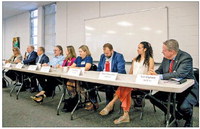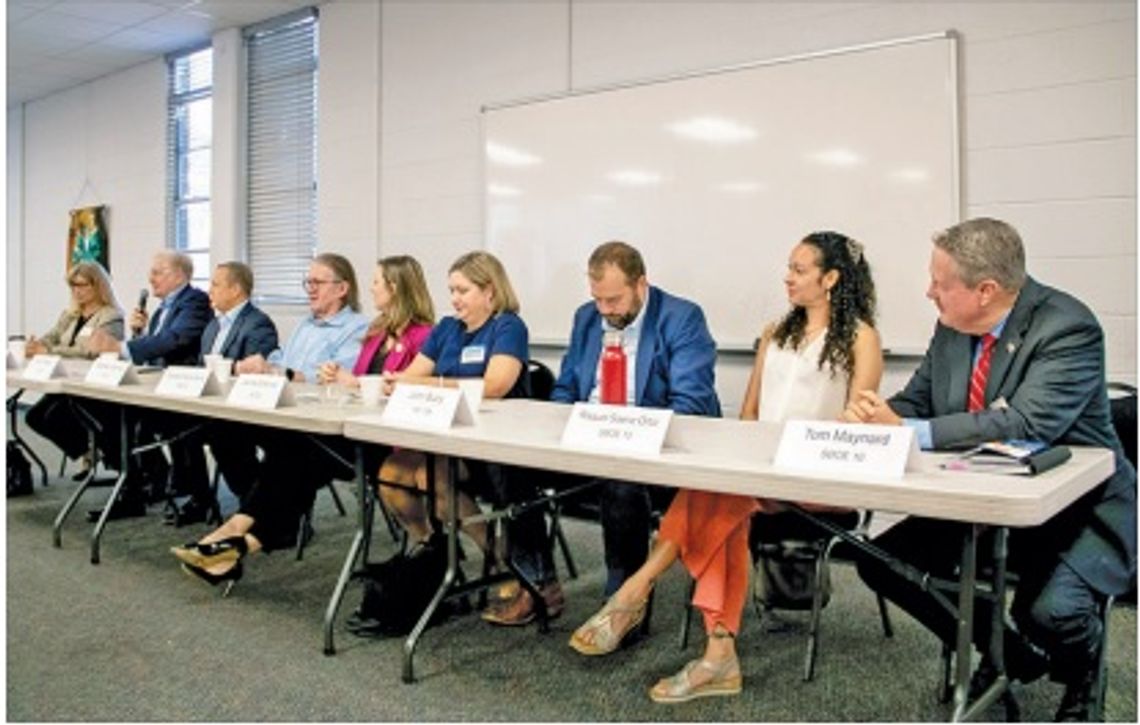To prepare its members for the upcoming election season, the Williamson County Retired Teachers Association held its fourth biennial candidate forum during the Oct. 11 association meeting at the Taylor Independent School District Event Center.
The forum showcased issues the association listed as priorities for the 89th Legislative Session — such as Social Security and retirement funds — in addition to classroom and curriculum policy. The session convenes Jan. 14.
The panel, the largest one the association has hosted, included congressional candidates Theresa Boisseau and Stuart Whitlow; state House of Representatives candidates Terry Wilson, Stephen Wyman, Caroline Harris Davila, Jennie Birkholz and John Bucy; and State Board of Education candidates Raquel Saenz Ortiz and Tom Maynard.
“What we’re trying to do here is to find an atmosphere and a forum in which the issues that are of interest to this group can be shared with you and where you can, in turn, respond to them as to how you would see a solution occurring and all done in a way that you build a relationship for when you serve in office,” the association’s Legislative Committee Chairman Larry Yawn told the panel of officeseekers.

Since many Texas school districts do not participate in Social Security, a large population of teachers aren’t eligible to reap the benefits, or they receive reduced benefits if they pay into the system through other employment, due to a state retirement system.
At the federal level, the TRTA supports House Bill 82, the Social Security Fairness Act of 2023, which would repeal provisions — the Windfall Elimination Provision and Government Pension Offset — that cause reduced Social Security benefits for individuals who receive other disbursements.
The congressional candidates were given the floor first to discuss the issue.
Both Boisseau and Whitlow, Democrats who are running for U.S. House districts 10 and 31, respectively, advocated for removing the provisions.
Having left the teaching profession some time ago, Boisseau no longer receives funds from the retirement system and wasn’t up to date on issues until she met with constituents during her campaign who face a negative impact by the programs. She reached out to a former student who works for the Teacher Retirement System, or TRS, to learn more.
“(A constituent) was in the Army, worked in corporate and then became a teacher because he wanted to serve his community, and he’s losing 65% of his Social Security because of these rules,” Boisseau said. “I’ve also talked to a woman who was a teacher, and she’s not eligible for her husband’s Social Security, either. I’m sorry I did not know about these things, and it really made me angry.”
Boisseau also advocated allowing teachers to have a choice whether they want to participate in Social Security, while Whitlow argued the system should stay separate from the TRS in hopes of improving the latter.
The discussion then shifted to the House candidates as they discussed the retirement system and other financial issues at the state level.
At this level, the TRTA wants to maintain a solvent TRS pension fund by fully funding statutory contribution rates and using excess state revenues to reduce unfunded liability.
When asked to decide between having a defined benefit or a defined contribution for teachers, all the candidates agreed on a defined benefit.
In her answer, state House District 52 Rep. Harris Davila, a Republican, brought up the 88th legislative session’s work to make the TRS fund solvent by passing Senate Bill 10, bringing the value of the TRS fund to $210 billion.
“That’s because of y’all and your hard work showing up to session year after year after year, so y’all should be proud of that,” she told the retired teachers.
As a retired teacher currently receiving TRS funds, Wyman, a Democrat who is running for state House District 20 against incumbent Wilson, a Republican, distinguished the issue with defined contribution.
“If you have defined contribution, your money could run out well before you do, and that is a problem that defined benefit solves,” Wyman said.
When it came to whether the state’s excess funds, also known as the Rainy Day Fund, should be used to support the retirement funds, there was a mix of answers from the candidates.
Wilson and Harris Davila maintained the Rainy Day Fund exists for a reason, citing natural disasters recently affecting the state, including hurricanes, wild fires and COVID-19, and that the support could come from elsewhere.
Birkholz, on the other hand, called it a wise investment, citing the record high of excess funds and the importance of supporting public education. Birkholz, a Democrat, is running against Harris Davila for the state House District 52 seat.
The comptroller’s office projected in May 2023 that the state’s Rainy Day Fund would hit its cap for the first time with $23.8 billion. In each biennium, the fund can be no more than 10% of the amount of certain revenue deposited into the General Revenue Fund during the previous biennium.
State House District 136 Rep. Bucy, a Democrat, agreed with both sides, acknowledging that while the excess funds are meant to help in times of need, there is more than enough to lend some to support the retirement system.
As an odd man out, Wyman said there is no such thing as a biennial surplus and extra money means funds weren’t spent at all, spent right or residents were overtaxed.
“There always needs to be overview every legislative session of what we take in as revenue and what we spend,” he said.
Another mix of answers came when the state House candidates were asked about their thoughts on the impact of school vouchers on retirement funds. School vouchers allow parents to send their children to private schools and use public tax dollars to subsidize tuition. Gov. Greg Abbott during the last legislative gathering called several special sessions in hopes of getting the measure passed, but the effort failed.
Bucy, Birkholz and Wyman all opposed the voucher system, citing a long-term negative impact on retirement funds as teachers would follow the growth of students in private schools, leading to fewer public teachers paying into the retirement system.
“That’s part of our job as legislators, is to not just look at today’s impact but look at tomorrow and tomorrow and tomorrow’s, right?” Birkholz said. “We have to be able to see into the future of that, what the impact is going to be on retirees, the impact of our children and so on and so forth.”
On the other side of the spectrum, Harris Davila cited how school choice programs in 31 other states have positively affected teacher retirement funds.
In between, Wilson acknowledged the possibility of fewer teachers in public schools due to a growing private sector having an effect on funds, but called the question too broad with “100 different ideas in terms of school choice out there,” he said.
While the system’s passing is not within their mandate, the two State Board of Education candidates, both running for the District 10 seat, also shared their thoughts as the board does have a hand in school choice with the ability to approve or disapprove charter schools.
Charter schools receive state funding based on enrollment, but not local taxpayer dollars, officials said.
Saenz Ortiz followed the majority opinion from the state House candidates and opposed vouchers, citing her previous experience as a teacher in Title 1 and low-income schools. “I see the struggles that schools are facing with funding right now,” she said. “We really need legislation that’s going to keep teachers in place — that’s going to keep our public schools strong.”
Incumbent Maynard, a member of the GOP, said he was for school choice but acknowledged that public schools need more funding, sharing his knowledge as the board’s chairman of school finance that it’s in the works as the SBOE seeks to improve returns on the Permanent School Fund.
With the mention of charter schools, the education board candidates were asked their thoughts on the expansion of the charter system in Texas.
Maynard believed that charter schools should be expanded to where they are needed to provide more options. He mentioned that expansion doesn’t fall under the board but should since it’s responsible for initial approvals of charter schools.
Saenz Ortiz, a Democrat, said that if charter schools were going to increase, they should be held accountable to ensure they don’t close to avoid wasting funds and that they meet the standards public schools are held to if they receive public funding, which they currently don’t.
Election day is Nov. 5, and early voting begins Oct. 21 and ends Nov. 1. The deadline to apply for a mail-in ballot is Oct. 25.




